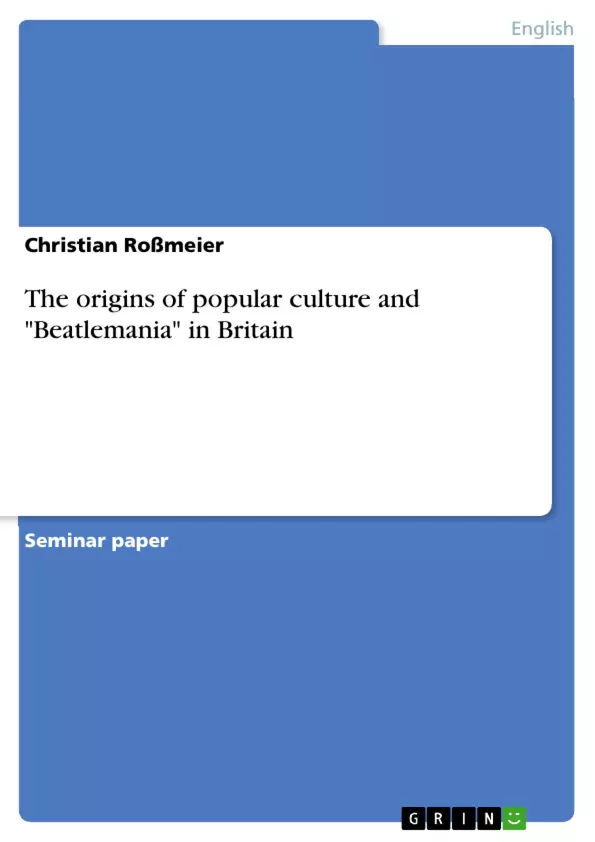This paper analyses the origins of popular culture and the so-called "Beatlemania" in Britain.
Before the 1960s, the whole world had to recover from the Great War, for instance, in 1948 restrictions on rationed goods were gradually lifted three years after World War II had ended, the rationing of clothes ended the following year, and so on. Finally recovered, Great Britain stood before good times after in 1954 fourteen years of food rationing completely ended at midnight when restrictions on the sale and purchase of meat and bacon were lifted. The economy of Britain evolved quite successful as can be seen on manufacturing and export economy, above all the main industries steel, coal, automotive and textiles.
Overall, it seemed to be a change not just in economy. Caused by the economical upswing, many people were employed and, consequently, obtained payment which increased their disposable income. That fact gave the Britons more freedom and therefore they were able to afford household items such as televisions, refrigerators, washing machines etc, as well as cars; even hire-purchases, i. e. arrangements for payment by installments, were usual. Also young adults or teenagers, who were working besides school mostly in part-time jobs, earned their own money in those days. Benefitted by that, they were able to purchase goods on their own, independent from their parents and other adults.
In contrast to previous youth generations, especially pre-war generations, young people could enjoy the omnipresent music and fashion which was spread by mass-media such as magazines or television. With the new freedom and possibilities, the younger generation had the chance to develop their own identity instead of living like the other adults. But they were not just using this chance; they even rebelled and broke away from their parents, which resulted in the emergence of youth culture as well as popular culture.
Inhaltsverzeichnis (Table of Contents)
- Origins of Popular Culture and Beatlemania in Britain
- Popular Culture
- Beatlemania
- The Influence of the 1950s on Britain
- Economic Upswing
- The Emerging Youth Culture
- The Emerging Youth Culture
- Fashion
- Music
- Other Events
- Youthquake
Zielsetzung und Themenschwerpunkte (Objectives and Key Themes)
The main objective of this work is to explore the origins of popular culture and Beatlemania in Britain, focusing on the factors that contributed to their emergence in the 1960s. The work aims to understand the social and cultural contexts that led to these phenomena, including the economic upswing of the 1950s, the rise of youth culture, and the impact of music and fashion.
- The definition and characteristics of popular culture
- The significance of Beatlemania in shaping British culture
- The role of economic prosperity in the development of youth culture
- The influence of music and fashion on the emergence of popular culture
- The impact of social and political changes on the transformation of British society
Zusammenfassung der Kapitel (Chapter Summaries)
- Origins of Popular Culture and Beatlemania in Britain: This chapter introduces the key terms of popular culture and Beatlemania, defining their meaning and historical context. It highlights the importance of understanding the social, cultural, and economic factors that shaped their emergence in Britain.
- The Influence of the 1950s on Britain: This chapter focuses on the post-war economic recovery in Britain, exploring the social and cultural consequences of economic growth. It examines the impact of increased disposable income, technological advancements, and changing social values on the rise of youth culture.
- The Emerging Youth Culture: This chapter delves into the specific manifestations of youth culture in Britain, including fashion, music, and other cultural trends. It explores the role of key figures like Mary Quant and the influence of Italian fashion on the emergence of the Mod subculture. The significance of music in this context, particularly the rise of the Beatles, is also discussed.
Schlüsselwörter (Keywords)
This work focuses on the intersection of popular culture, youth culture, and Beatlemania in Britain. Key concepts include: popular culture, Beatlemania, youth culture, economic upswing, fashion, music, social change, and the role of mass media.
Frequently Asked Questions
What were the origins of popular culture in 1960s Britain?
Popular culture emerged from the post-war economic upswing, increased disposable income for teenagers, and the rise of mass media like magazines and TV.
What exactly was "Beatlemania"?
Beatlemania refers to the intense fan frenzy and cultural phenomenon surrounding the Beatles, which fundamentally shaped British youth culture and music.
How did the economy of the 1950s influence the youth?
The end of food rationing and a successful manufacturing economy provided young people with their own money, allowing them to buy fashion and records independently.
What role did fashion play in the "Youthquake"?
Fashion, led by figures like Mary Quant and the Mod subculture, allowed the younger generation to rebel against parental norms and express their own identity.
Why did teenagers in the 60s rebel against their parents?
Unlike previous generations, they had the financial freedom and cultural resources (mass media) to create a distinct lifestyle separate from the adult world.
- Quote paper
- Christian Roßmeier (Author), 2011, The origins of popular culture and "Beatlemania" in Britain, Munich, GRIN Verlag, https://www.grin.com/document/462632



